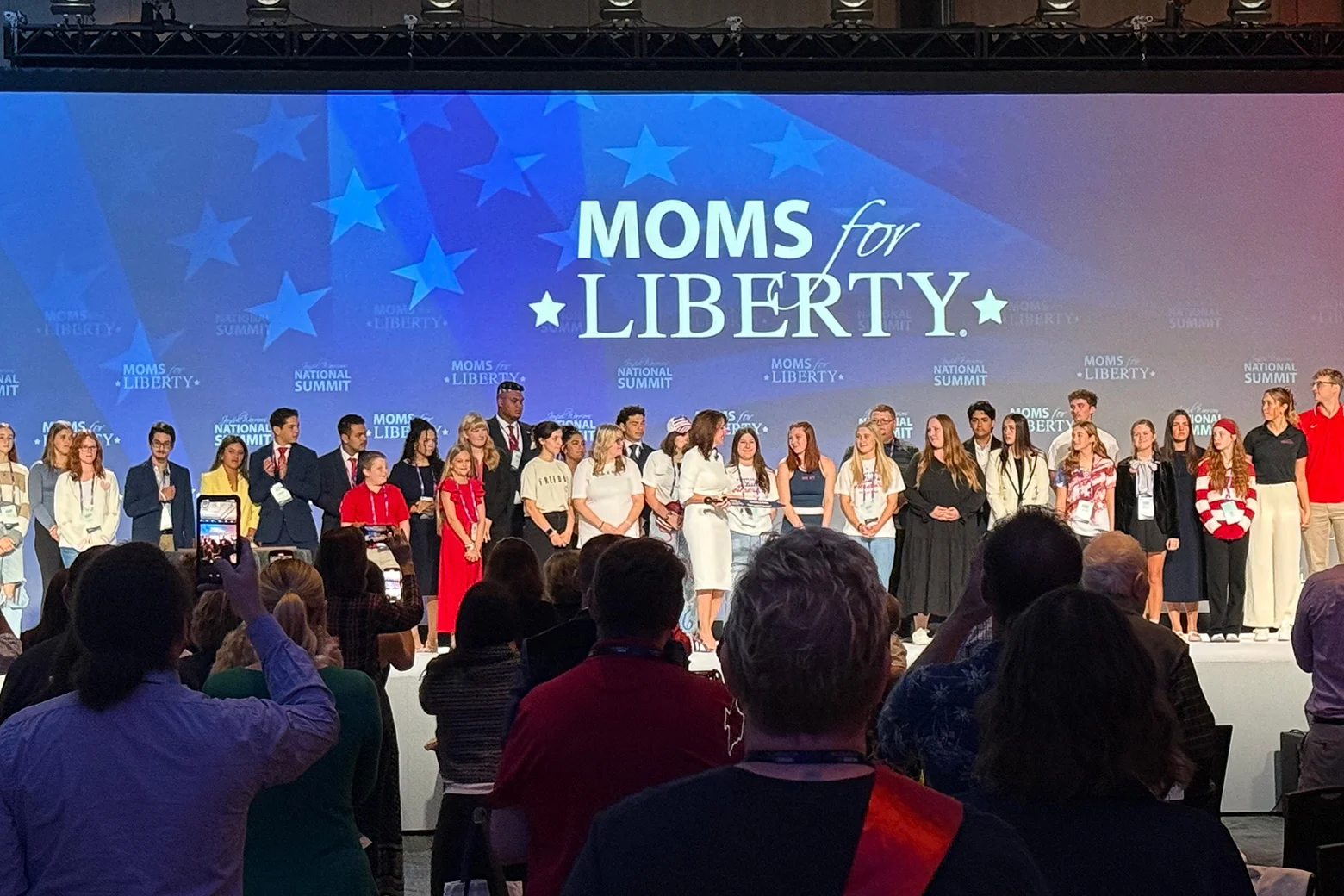Copyright Slate

This story about Moms for Liberty was produced by the Hechinger Report, a nonprofit, independent news organization focused on inequality and innovation in education. Sign up for the Hechinger newsletter. It’s not a rebrand. But the Moms for Liberty group that introduced itself three years ago as a band of female “joyful warriors,” shedding domestic modesty to make raucous public challenges to masks, books, and curriculum, is trying to glow up. The group’s national summit this past weekend at a convention center outside Orlando, Florida, leaned into family (read: parental rights), faith—and youth. The latter appeared to be a bid to join the cool kids who are the new face of conservatism in America (hint: young, Christian, very male), as well as a recognition of the group’s “diversity,” which includes grandparents, men, and kids. But even as the youth—including twenty- and thirtysomething podcasters and social media influencers, as well as student members of the late Charlie Kirk’s Turning Point USA— brought a high-energy vibe, stalwart members got a new assignment. Where past Moms for Liberty attendees were urged to run for school boards, this year they were encouraged to turn their grievances into legal challenges. Moms for Liberty CEO and co-founder Tina Descovich acknowledged that while many of them had experienced backlashes as a result of running for school board or publicly challenging books, curricula, and policies, they needed to continue the fight. (The more pugnacious co-founder, Tiffany Justice, is now atHeritage Action, an arm of right-wing think tank the Heritage Foundation.) “You have lost family, you have lost friends, you have lost neighbors, you’ve lost jobs, you’ve lost whole careers,” she said to attendees. Yet she insisted that it was vital that they “shake off the shackles of fear and stand for truth or we are going to lose Western civilization as a whole.” The gathering held up “the free state of Florida” as an example of Republican policies to be emulated, including around school choice and parental rights. The state’s attorney general, James Uthmeier, boasted of having created a state Office of Parental Rights last spring, describing it as “a law firm for parents.” He trumpeted the state’s lawsuit against Target over the “market risks” of LGBTQ+ pride-themed merchandise and encouraged parents to reach out with potential legal actions. “If you’re identifying one of these wrongs that’s violating your rights and then subjecting our kids to danger and evil, then we want to know about it,” he said. “And we’re going to bring the heat in court to shut it down.” The shifting legal landscape, not just in Florida but nationally, had speakers gushing about the opportunity to file new challenges, particularly in the wake of the Supreme Court decision in Mahmoud v. Taylor in June. It gives parents broad power to object to school materials, including with LGBTQ+ themes, and the right to remove their children from public school on days when such materials are discussed. “This is where we need to take that big Supreme Court victory and start fleshing it out,” said Matt Sharp, senior counsel at Alliance Defending Freedom, a Christian law firm. He added that they were “needing warriors, joyful warriors, to file cases to start putting meat on the bones of what that does.” The directive to file suit was not just around opt-out policies, which were the basis for the Mahmoud case. (Moms for Liberty has opt-out forms and instructions on its website.) Rather, attendees were also urged to file lawsuits in support of school prayer; against school policies that let students use different names and pronouns without parental consent (what Moms for Liberty terms “secret transitions”); and to give parents access to surveys students take at school, including around mental health. “We need people willing to stand up legally and be, you know, named plaintiffs,” Kimberly S. Hermann, president of the Southeastern Legal Foundation, a conservative policy group, said on a panel featuring two moms who sued their school districts. Winning a lawsuit or even just bringing one in one state, said Hermann, can get other school districts and states to adopt certain policies, presumably to avoid lawsuits themselves. “One offensive litigation can have this amazing ripple effect,” she said. She and others made clear that there is staff to provide support. The legal groups will “stand with you,” said Sharp, “whether you’re passing the law or passing the local policy, all the way to litigating these cases.” Even as speakers criticized public schools, particularly around LGBTQ+ issues, seeing this not as a form of inclusion but as foisting views into classrooms, they relished the chance to infuse their values into schools. Filing these lawsuits is more than “just fighting for your role as parents,” Sharp told parents in a breakout session. “You’re ultimately fighting for your kids’ ability to be in their schools and make a difference, to be the salt and light in those classrooms with their friends and to take our message of freedom, of faith, of justice and to really spread it all across the schools.” Overall, this year’s Moms for Liberty event lacked the obvious drama of recent years. The flood of protesters in 2023 in Philadelphia required a large police presence and barricades around the hotel, along with warnings not to wear Moms for Liberty lanyards on the streets. This year, there were no protests. That was partly because the event was held in a secluded resort convention center that could accommodate 800 (larger than the 500-ish of past hotels). But the group failed to fill the venue or attract much media attention. There was an on-location broadcast by Real America’s Voice, a conservative news and entertainment network, from a set outside the Sun Ballroom. (Steve Bannon interviewed Descovich on his show The War Room.) It also didn’t draw opposition because protesters had a bigger target. Saturday saw “No Kings” rallies across the country, with thousands decrying what they see as President Donald Trump’s authoritarianism. “I forgot it was happening since they’re mostly ignored these days,” state Sen. Carlos Guillermo Smith, and a senior advisor to LGBTQ+ rights group Equality Florida, said in a text message about the Moms for Liberty event. Liz Mikitarian, founder of the national group Stop Moms for “Liberty,” which is based in Florida, said the moms “are still a threat,” but not worth organizing a protest against. It was also a quieter affair than last year’s in D.C. There, Trump’s appearance fed a party atmosphere, with Southern rock, sequined MAGA outfits, and a cash bar. (This year, Trump appeared, but only in a recorded video message.) The three-day event, of course, aired familiar grievances in familiarly florid language—conservative school-choice activist Corey DeAngelis railed against teacher unions over the “far-left radical agenda that they’re trying to push down children’s throats in the classroom.” Other sessions covered the expected—the alleged dangers of LGBTQ+ policies, in sports, restrooms, school curricula, and books—but there was also discussion of concerns (shared on left and right) over youth screen use, online predators, and artificial intelligence. The event made room for MAHA, the Make America Healthy Again movement led by Robert F. Kennedy Jr., the secretary of Health and Human Services. Descovich interviewed Dr. Joseph Ladapo, the Florida surgeon general who is working to eliminate all vaccine mandates for the state’s schoolchildren. But the move by Moms for Liberty to attract young conservatives elevated the energy in the room. It was apparent not only in a tribute to Kirk, the slain founder of Turning Point USA, which trains young conservatives on high school and college campuses. About 40 Florida TPUSA members took the ballroom stage to accept the “Liberty Sword,” the group’s highest honor, posthumously awarded to Kirk. It also showed up in a breakout session of mostly conservative social media influencers and podcasters who offered tips on using humor and handling online trolls: Lydia Shaffer (aka the Conservative Barbie 2.0), Alex Stein, Gates Garcia, Kaitlin Bennett, Angela Belcamino (known as “The Bold Lib,” who said she was surprised to have been invited), and Jayme Franklin, who in addition to having a podcast is the Gen Z founder ofthe Conservateur, a conservative lifestyle brand that the New Yorker called “Vogue, but for Trumpers.” They have built huge followings based on their compulsion to provoke. “We need to go back to biblical values of what it means to be a real man and what it means to be a real woman,” urged Franklin. “People want that guidance, and that needs to begin at church. We need to push people back into the pews.” Their inclusion, like that of conservative commentator Benny Johnson, who moderated a panel, “Fathers: The Defenders of the Family,” appeared to recognize a need to expand the base—and be edgier. Johnson charged out on stage and trumpeted that “God’s first commandment to us was ‘Go, be fruitful, multiply.’ Go make babies!” He quipped that “right-wing moms, they’re happier, right?” and asked the crowd, “Any tradwife moms out there?” The phrase is shorthand for a woman who embraces a traditional domestic role, often with an emphasis on fashion and style. Johnson—who credited Kirk for prodding him to find Jesus, get married, and become a father (he has four children)—argued that Republicans, especially those in Gen Z, should embrace the traditional nuclear family identity as a winning political move. “We are the party of parents. We are the party of children,” he said, adding that traditional values were already dominating culture and politics. “We live in a center-right country. And I’m tired of pretending that we don’t,” he said, and showed a map of red and blue votes in the 2024 presidential election. “This is the shift. You live in a red kingdom.”



